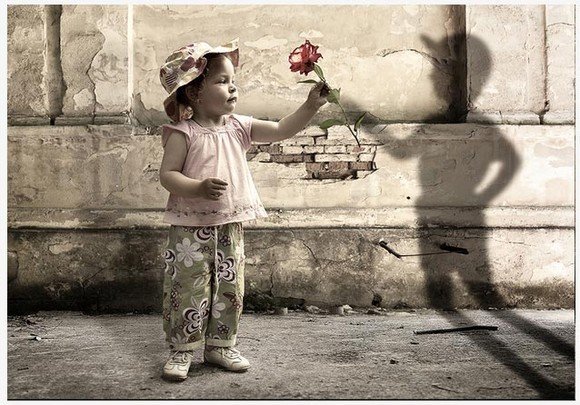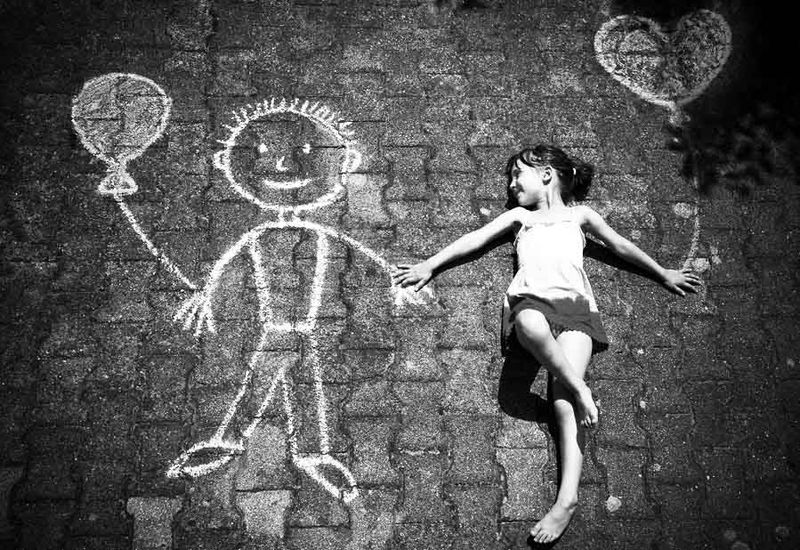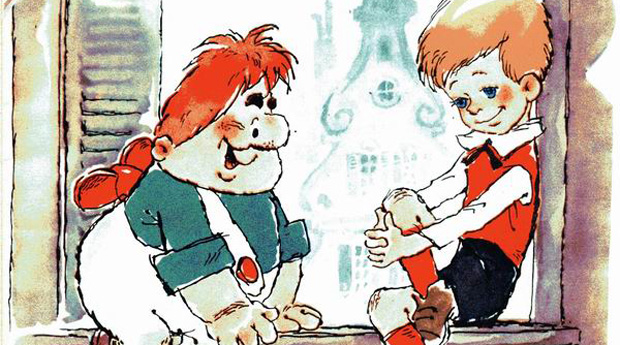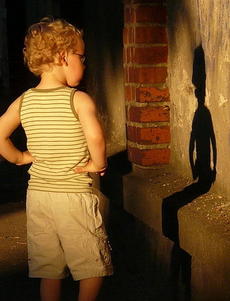For many three-year-olds, imaginary friends are an integral part of growing up. However, parents often worry that leaving for a fantasy world can lead to a separation from reality and even problems in psychological development. Is there any need to worry if a fictitious buddy appears in your child’s life?

Imaginary friends: who are they?
By the age of three, the child develops the ideal image of a friend for games and communication. If he does not find such a friend in reality, he easily invents it. So there is a fictional friend who may look like a person (remember Carlson), a superhero, a character in a fairy tale, a cartoon. “Appearance”, habits and features of a fictional friend will depend only on the imagination of the baby.
An imaginary friend can be a child’s constant companion or just an incoming partner for joint games. It can exist only in a certain place: at the grandmother's dacha or in the children's room. No one knows when it will appear or disappear.
Reasons for the appearance of a fictional friend
 Think for a moment, what is it like to be a little kid? You are constantly told what and when to do, older brothers and sisters (if any) pick up toys and compete for the attention of adults. Who in such a situation would not want a friend who never takes your typewriter, does what you say, and always comes to the rescue? An imaginary buddy can protect when a baby is scared, becomes The scapegoatwhen it will be necessary to blame someone, and will be an outlet when he wants to laugh or cry.
Think for a moment, what is it like to be a little kid? You are constantly told what and when to do, older brothers and sisters (if any) pick up toys and compete for the attention of adults. Who in such a situation would not want a friend who never takes your typewriter, does what you say, and always comes to the rescue? An imaginary buddy can protect when a baby is scared, becomes The scapegoatwhen it will be necessary to blame someone, and will be an outlet when he wants to laugh or cry.
There are several reasons why the child makes friends and prefers to play with them.
- Loneliness
If your baby is the only child in the family, then the likelihood of a character invented increases dramatically. A child can become more dependent on his imaginary friends if it is difficult for him to find friends of his age.

- Desire to be first
If the only friend is older and also likes to command, then the child may well come up with a friend to find solace. Often pushed children create imaginary friends that are easy to talk to and who will always allow them to win or take the lead in any game. An imaginary friend is part of a fantasy world where a child is a winner.
- Voltage
A child can also experience stress for various reasons - he has problems in a kindergarten or school, it is difficult for him to make friends, it is difficult for him to live in the shadow of his older brother, whom others consider him to be better. Often, we misinterpret these difficulties, set aside, as we are too busy to notice the needs of the child. In all such situations, the child comes up with an imaginary friend and tells him about all the problems.
How to chat with imaginary friends
Here are some tips for communicating and interacting with your child’s fictional pals.
- Take a child's fantasy
Do not constantly indicate to the baby that his friends are not real. Be kind and friendly and respond to children's requests. After all, there is nothing complicated in pouring an extra mug of tea or opening the door to an invisible friend.

- Do not suppress his imagination
Imagination is very important for a child. Do not laugh at nonexistent friends. The wrong reaction of the parents can make the child go even deeper into the fantasy world. Or he just stops fantasizing.
- Do not initiate communication
Do not ask the child if his fictional friend is going to go with you for ice cream. Wait until your child remembers him and then play together. At the same time, give your baby the opportunity to express her feelings. When he does not know with whom to share his experiences, he uses an imaginary friend.
- Do not let the child shift responsibility
Do not allow the child to blame the imaginary friend for what he is doing wrong. Children should still be held accountable for their actions, and the task of parents is to remind them of the consequences. If the child accuses the fictional character of a mess in the nursery, ask him to clean the room with him. If the baby refuses, then the game is over, and let him remove the scattered toys.
- Do not use a friend for "selfish" purposes
It is not very good to tell the child: "Dima wants you to eat semolina." The kid can understand that you are manipulating him.
- Encourage the imagination
Spend more time with your child. Let your kid pretend, play with dolls, put on superhero costumes, read adventure books. And do it with him. The child invents a friend due to the fact that he does not receive enough attention from his parents. Do not let your imaginary friend replace real friends and your attention.
- Get to know your baby better
 Imaginary friends can give you an idea of how your child actually feels. If his friend Dima is afraid of the dark, then perhaps your baby is experiencing this fear. Keep track of your friend and learn from him.
Imaginary friends can give you an idea of how your child actually feels. If his friend Dima is afraid of the dark, then perhaps your baby is experiencing this fear. Keep track of your friend and learn from him.
Having a fictitious buddy is perfectly normal. Often, he helps children cope with changes in life or the acquisition of social skills. Treat it as yet another step in growing up a child.
We read on the topic:When a child’s fantasies become dangerous
We also read interesting publications:
- No matter how fast the society develops, no matter how the views on education, values and attitudes change, we cannot imagine childhood without a fairy tale. And this is absolutely correct, because a fairy tale is simply necessary for the harmonious development of a little man -The effect of fairy tales on child development
- Any parent wants to educate his baby well. What do you personally invest in this “good”? Are your parenting methods right? Young parents make many mistakes that adversely affect the physical capabilities of your child, his mental state. How to avoid basic mistakes in education? -Top 10 Parent Mistakes in Parenting
- Parental fatigue, views on the upbringing, and sometimes the behavior of the child lead to the fact that mom or dad is often annoyed at the child, break into a cry, get angry. Of course, parents do not stop loving, but in fact, children often hear negative words addressed to them - 25 tips for raising a child in love and peace
- Raising a child’s voice is often taken for granted: how can you somehow make him obey and recognize parental authority? -10 tips to stop yelling at your children









My daughter, at about 2 years old, had an imaginary friend. At first, it bothered me a lot, and I even went to a psychologist. But then I realized that this is the norm and a year later my friend was gone.
If the child is small, then there is no reason for concern. My son, up to 4 years old, had some friends. I even asked what their name was, what they were doing. And this is normal.
Unfortunately, we had to turn to a psychologist. Because I was guarded by the fact that this same friend appears precisely when the child is scared .. As a result, we are now going to classes ..
My daughter recently told me about her secret friend, and so far I'm completely calm. I am sure that soon there will be no girlfriend. But if it drags on, I will turn to a psychologist.
In my daughter I had a lot of such friends and Katya and Marina and Dominica and even their parents.